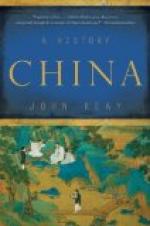hundreds of years its books were distributed and read
only in secret, and many of its members were executed
as revolutionaries. Thus, this school, instead
of becoming the nucleus of a school of natural science,
was driven underground. The secret societies
which started to arise clearly from the first century
B.C. on, but which may have been in existence earlier,
adopted the politico-scientific ideas of Tsou Yen’s
school. Such secret societies have existed in
China down to the present time. They all contained
a strong religious, but heterodox element which can
often be traced back to influences from a foreign
religion. In times of peace they were centres
of a true, emotional religiosity. In times of
stress, a “messianic” element tended to
become prominent: the world is bad and degenerating;
morality and a just social order have decayed, but
the coming of a savior is close; the saviour will
bring a new, fair order and destroy those who are
wicked. Tsou Yen’s philosophy seemed to
allow them to calculate when this new order would
start; later secret societies contained ideas from
Iranian Mazdaism, Manichaeism and Buddhism, mixed
with traits from the popular religions and often couched
in terms taken from the Taoists. The members of
such societies were, typically, ordinary farmers who
here found an emotional outlet for their frustrations
in daily life. In times of stress, members of
the leading elite often but not always established
contacts with these societies, took over their leadership
and led them to open rebellion. The fate of Tsou
Yen’s school did not mean that the Chinese did
not develop in the field of sciences. At about
Tsou Yen’s lifetime, the first mathematical
handbook was written. From these books it is obvious
that the interest of the government in calculating
the exact size of fields, the content of measures
for grain, and other fiscal problems stimulated work
in this field, just as astronomy developed from the
interest of the government in the fixation of the
calendar. Science kept on developing in other
fields, too, but mainly as a hobby of scholars and
in the shops of craftsmen, if it did not have importance
for the administration and especially taxation and
budget calculations.
Chapter Five
THE CH’IN DYNASTY (256-207 B.C.)
1 Towards the unitary State
In 256 B.C. the last ruler of the Chou dynasty abdicated in favour of the feudal lord of the state of Ch’in. Some people place the beginning of the Ch’in dynasty in that year, 256 B.C.; others prefer the date 221 B.C., because it was only in that year that the remaining feudal states came to their end and Ch’in really ruled all China.




